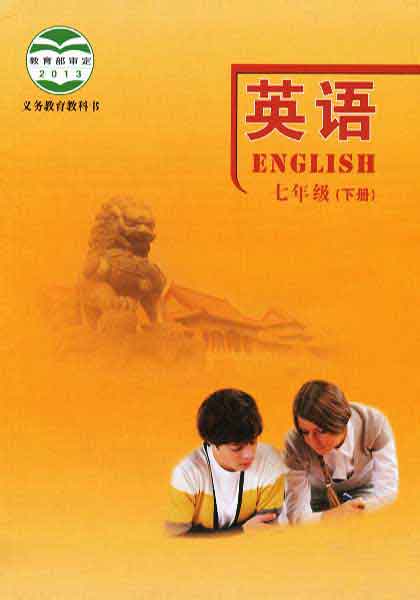Notes to the Texts课文原文、中英文对照及听力音频听读
Notes to the Texts 翻译:
Unit 1 Daily Life 翻译:第一单元 日常生活
Lesson 2 翻译:第二课
1. It is boring, but we have to do it. (收拾房间)挺无聊的,但是我们不得不做。have to do不得不做......,必须做......。如: I have to get up early every day.我每天都得早起。 We have to drive on the right in China.在中国,必须靠右侧行驶。 翻译:
2. At 6:00, training starts with team exercise.六点钟,训练以小组练习开始。 start with以......开始。如: Our English class ofen starts with an English song.我们的英语课经常以一首英文歌开始。 翻译:
3. We must try our best to keep everyone safe.我们必须尽最大努力,确保所有人安全。 (1) try one's best尽某人最大的努力。如:I must try my best to help him.我必须尽最大努力帮助他。 (2) keep+名词+形容词,意为“使......保持某种状态”。如:We must keep our classroom clean.我们必须保持教室清洁。 This coat keeps me warm.这件外套使我暖和。 翻译:
Lesson 3 翻译:第三课
1. I think walking in a storm is dangerous, and going online is not.我认为在暴风雨中行走危险,而上网不危险, (1)当我们想把某个动作用作主语时,可以使用动词的-ing形式。在这个句子中,walking in a storm及going online中的walking和going是句子的主语。 (2)go online上网。此处online用作副词,意为“(计算机)联机地,在线地”。online还可以用作形容词,意为“在线的,联网的”。如:an online printer联网打印机 翻译:
2. Also, don't take a shower or bath.也不要淋浴或泡澡。 此处,take意为“做”。take a shower意为“淋浴”; take a bath意为“泡澡”。又如:take a walk散步 take a look看看 take a rest休息一下 take a trip旅行 翻译:
3. Stay away from the windows and stay away from the TV.远离窗户和电视。 stay away from与......保持距离,离开......。如: Children should stay away from dangerous things.孩子们应该远离危险物品。 翻译:
Communication Workshop 翻译:沟通工作坊
I get to schoo at 7:50.我7:50到校。 get to到达。如: We got to the station at 8 o’clock.我们八点钟到达车站。 Mum gets home at 6:30 every day.妈妈每天六点半到家。 在这个句子里,home 用作副词,所以没有to。 翻译:
Unit2 On the Weekend 翻译:第二单元 在周末
Lesson 4 翻译:第四课
1. She is talking on the phone now.她正在打电话。 talk on the phone打电话。如: Linda loves talking on the phone.琳达喜欢煲电话粥。 翻译:
1. She is talking on the phone now.她正在打电话。 talk on the phone打电话。如: Linda loves talking on the phone.琳达喜欢煲电话粥。 翻译:
2. He is looking out of the window.他正往窗外看。 此处,look out意为“往外看”。look out还有“小心,注意'的意思。如:Look out! There's a car coming.小心!有车开过来。 翻译:
Lesson 5 翻译:第五课
1. instant message即时消息 通常指用网络即时通讯工具(如QQ、MSN等)收发的信息。 翻译:
2. She's doing her hair, so I can use her computer for a while.她正在做头发,所以我可以用一会儿她的电脑。 (1) do one's hair做头发。与hair相关的其他搭配还有: brush one's hair梳头发 wash one's hair洗头发 colour one's hair染头发 (2) for a while 一会儿。如: Let's sit down and take a rest for a while. 咱们坐下歇会儿吧。 翻译:
3. Oh, wait a minute.啊,等一下。 a minute 片刻。 翻译:
4. The game's over.比赛结束了。 此处,over用作副词,意为“终了,结束”。如: Class is over.下课。 翻译:
Lesson 6 翻译:第六课
1. Not really.不太(认识)。 Not really.并不完全......。 此处,really用作感叹词,在会话中表示附和、感兴趣、怀疑、惊讶或轻度的不快。如: — I hear Ann likes horror films.听说安喜欢恐怖电影。 — Oh, really?啊?真的啊! 翻译:
2. Sorry, I'm not sure.抱歉,我不太清楚。 I'm not sure.我不确定。 翻译:
3. Do you know the way to ...?你知道去......怎么走吗? Can you tell us the way to ...?你能告诉我们去......的路吗? 以上两句都是问路用语。如: Do you know the way to the police station?你知道去派出所怎么走吗? Can you tell me the way to the hotel? 你能告诉我去宾馆怎么走吗? 此外,问路时还可以说: Can you tell me how I can get to...?你能告诉我怎么才能到......吗?如: Can you tell me how I can get to the cinema?你能告诉我怎样去电影院吗? 翻译:
Communication Workshop 翻译:沟通工作坊
The History Museum is on the corner of Moon Street and First Street.历史博物馆在Moon大街和First大街的拐角处。on the comer of 在......的拐角处。如: There is a flower shop on the corner of the street. 街角有一家花店。 翻译:
Unit 3 Food and Drink 翻译:第三单元 食物和饮料
Lesson 7 翻译:第七课
1.一Excuse me. How much are the tomatoes?劳驾,西红柿怎么卖? 一They're seven yuan sixty a kilo. How many do you want? 七块六一公斤。你想要多少? (1) how much多少。用来询问价格、数量,修饰不可数名词。如: How much is the beef ? 牛肉怎么卖? How much meat do you need ? 你需要多少肉? (2) how many多少。用来询问数量,修饰可数名词复数。如: How many bananas do you want? 你想要多少香蕉? How many students are there in your class? 你们班有多少学生? 翻译:
1.一Excuse me. How much are the tomatoes?劳驾,西红柿怎么卖? 一They're seven yuan sixty a kilo. How many do you want? 七块六一公斤。你想要多少? (1) how much多少。用来询问价格、数量,修饰不可数名词。如: How much is the beef ? 牛肉怎么卖? How much meat do you need ? 你需要多少肉? (2) how many多少。用来询问数量,修饰可数名词复数。如: How many bananas do you want? 你想要多少香蕉? How many students are there in your class? 你们班有多少学生? 翻译:
2. I'll take six.我要买六个。 此处,take意为“买”。如: I'll take these shoes.我要买这双鞋。 翻译:
3. Here's your change.这是找你的零钱。change用作名词,意为“零钱,找零”。如: You may keep the change.不用找钱了。 翻译:
Lesson 8 翻译:第八课
1. How about some salad? 来些沙拉怎么样? How about ...? 意为“......怎么样?”,用来提出建议或请求。也可以说:What about ...? 如: What about another cake? 再吃块蛋糕怎么样? How about going out for a walk? 出去散散步好吗? 翻译:
2. Would you like a drink? 你要不要喝点什么? (1)这是餐馆的服务员征求顾客意见的用语。如果顾客需要,就说:'Yes,please.';如果不需要,就说:“No,thanks.' (2)would like想要......。它的缩写形式是'd like。如: I'd like an egg. 我想吃个鸡蛋。 Would you like some tea? 你要喝点茶吗? 翻译:
Lesson 9 翻译:第九课
1. That's food for thought.那是引人深思的。 food for thought引人深思的想法。如: There is much food for thought in this book. 这本书里有许多令人深思的内容。 翻译:
2. Host:Is there a secret? 主持人:有什么奥秘吗? Dr Hill : Kind of. 希尔医生:有几分。kind of为口语表达方式,意为“多少有点,有几分”。如: I feel kind of hot.我觉得有点儿热。 翻译:
Communication Workshop 翻译:沟通工作坊
1. Are your snacks usually fruit or junk food? 你的零食通常是水果还是垃圾食品? junk food垃圾食品。指不健康的、营养价值低的食品。 2. A lot of students have more than two drinks with sugar.许多学生(每天)喝两杯以上的含糖饮料。 more than......以上,超过......。如:There are more than 1000 students in that school.那所学校有一千多名学生。 翻译:
Unit 4 Seasons and Weather 翻译:第四单元 季节和天气
Lesson 10 翻译:第十课
1. It gets warm in April.四月份天气转暖。get warm是“变暖”的意思。get 与形容词连用,意为“变得”。如: It's getting dark outside. 屋外天色变暗了。Don't get upset.别难过。 翻译:
2. It's usually windy in spring, so you can see lots of people flying kites in Tian' anmen Square.春天通常有风。因此,在天安门广场,你能看到很多人放风筝。 see sb doing看见某人正在做......。如:You can see those children playing on the playground every aftermoon. 每天下午,你都能看见那些孩子在操场上玩儿。 注意:see sb do表示看到某人做某事的全过程;而see sb doing侧重动作进行的状态。如: I saw him cross the road.我看见他过了马路。 I saw him crossing the road.我看见他正在过马路。 翻译:
2. It's usually windy in spring, so you can see lots of people flying kites in Tian' anmen Square.春天通常有风。因此,在天安门广场,你能看到很多人放风筝。 see sb doing看见某人正在做......。如:You can see those children playing on the playground every aftermoon. 每天下午,你都能看见那些孩子在操场上玩儿。 注意:see sb do表示看到某人做某事的全过程;而see sb doing侧重动作进行的状态。如: I saw him cross the road.我看见他过了马路。 I saw him crossing the road.我看见他正在过马路。 翻译:
3. But remember to go early in the morning or late in the afternoon.但是要记得清早或傍晚去。 remember to do记得做......。如: Remember to bring the gift.记得带礼物来。注意:remember doing 表示记得过去曾经做过某事;而remember to do表示不要忘记要做的事。如: I remember closing the window.我记得关上窗户了。(现在还能回想起这件事。)I remembered to close the window.我没忘记关窗户。 翻译:
4. Is autumn as good as many people think? 秋天和人们想的一样好吗? as... as 像......一样。如: He is as tall as his father. 他和他爸爸一样高。 This film is as good as I think.这部电影和我想象的一样好。 翻译:
英语北师大版七年级下册课文目录
最新学习记录 更新时间:2026-02-26 09:28:22



 切换教材
切换教材